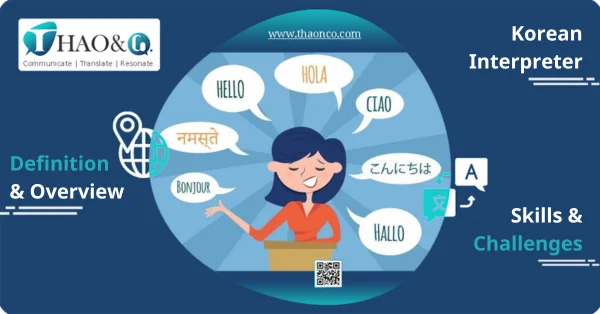Becoming a professional Korean interpreter has become a pursuit for many South Korean language and culture enthusiasts. To excel in the field of Korean interpreting, interpreters are required to equip and continuously fine-tune certain skills. Let’s delve into more details about these skills in the following article with Thao & Co.
Language interpretation involves the conversion of spoken language from one language into another while preserving the intended meaning. Language interpretation facilitates seamless communication and information transmission between participants without disruption or misunderstanding.
It is common for many people to misconstrue interpretation and translation. Despite both interpretation and translation being linguistic translation processes, they bear certain distinctions.
Interpretation is frequently employed in direct communication scenarios, demanding precise and almost immediate language interpretation. In contrast, language translation is applicable to textual content, documents, and others, necessitating meticulous, detailed, and refined processes.
Korean interpreting involves the Korean translation into another language and vice versa. The interpretation must occur promptly and accurately to achieve the desired communication effectiveness.
South Korea is a country imbued with distinctive cultural characteristics in both work and daily life. Korean interpreters should not only be proficient in the language but also comprehend and adapt to cultural nuances, ensuring the delivery of high-quality interpretations with the utmost professionalism.
The demand for Korean language interpretation is paramount, especially in the era of globalization. South Korea stands as one of the world’s leading exporters of automobiles, machinery, and electronic equipment, among other products. The country also imports substantial quantities of raw materials, processed goods, and energy resources, making trade engagements with Korean companies vibrant and diverse.

Various fields and industries require the expertise of Korean interpreters, including:
Furthermore, the tourism and beauty industries in South Korea are booming. These two leading edges of South Korea attract a significant influx of international visitors, contributing to the immense potential of Korean interpretation for those well-versed in the language.
While the task of Korean interpretation is intriguing and captivating, it comes with challenges that interpreters must address.
Sound linking and sound changes pose difficulties for Korean interpreter. Additionally, Korean often omits subject pronouns and certain sentence components, requiring interpreters to grasp the context of the content.
In particular, the sentence structure in Korean follows a subject-object-verb (SOV) grammatical order, which is contrary to many other languages such as English, Chinese, and Vietnamese. Without a firm grasp of Korean grammar, the interpreter is likely to misunderstand the speaker’s intention, resulting in an unnatural expression of sentences.
South Korea places significant importance on social status, incorporating a distinct honorific system. Depending on factors such as age, position, social status, and even the level of familiarity, varying forms of address are used.
This is in contrast to cultures in many Western countries where such honorifics may not exist. Interpreters must thoroughly understand these cultural nuances to choose words that accurately convey the speaker’s attitude and content.
South Korea is renowned for its “ppalli ppalli” culture which translates to the rushed lifestyle. Thus, Korean interpreters need to process information rapidly while maintaining precision to keep up with the swift working pace.
This may cause great psychological pressure for interpreters, especially at important, international conferences and events.
Specific fields such as healthcare, legal, and technical have their own specialized terminologies. In some cases, these technical terms may not even be found in dictionaries. Korean interpreters must possess a certain level of understanding in these areas to accurately choose the appropriate language.
The following are the skills that a professional Korean interpreter needs to hone.

To excel, Korean interpreters must be fluent in both the source and target languages. This means that in addition to Korean, interpreters should have a solid understanding of at least one other language. Interpreters need extensive knowledge of vocabulary, grammar, and other linguistic nuances to provide rapid and accurate interpretations.
A profound comprehension of South Korean culture, politics, arts, etc., deeply influences thinking, expression, and forms of address. A nuanced understanding of these elements helps interpreters seamlessly integrate into Korean culture, resulting in more natural and culturally appropriate interpretations.
Interpreters must possess efficient note-taking skills to capture essential information without missing crucial details. This is more than just jotting down everything they hear. It involves logical and quick note-taking using standardized symbols and characters.
Professional Korean interpreters should equip themselves with a keen memory. This aids in quickly processing and retaining information heard during interpretations.
This is particularly crucial when dealing with conferences where pieces of information are often interconnected, and interpreters need to remember them to ensure consistency in interpretations.
Interpretation often occurs in direct conversations and dialogues. Despite meticulous preparation, sudden turns of events may arise. Interpreters must retain equanimity, address issues with professionalism, and adeptly navigate challenges to ensure seamless proceedings.
In today’s era of technological advancement, interpreters need to understand technology to cater to various forms of interpretation. For instance, in remote interpretation, interpreters need to know how to use online meeting tools like Skype, Zoom, Meet, and more.
Moreover, simultaneous interpretation, which is commonly used in multinational conferences, requires proficiency in modern audiovisual equipment.
The interpretation process demands a high level of continuous concentration from Korean interpreters. In many circumstances, even a slight misinterpretation by interpreters can have significant consequences. Professional Korean interpreters are those able to work in a high-pressure environment.
Upholding client confidentiality is a practice not only for Korean interpreters but also for interpreters in any linguistic domain.
Additionally, interpreters must maintain an impartial demeanor during interpretation. Transmitted information ought to remain objective, devoid of personal opinions or speculations from the interpreter.
Korean interpreter’s service rate do not have an exact figure. The pricing may depend on these following factors:
Korean interpretation requires interpreters with high professional qualifications and in-depth knowledge of the Korean language and culture. Choosing a reputable and quality Korean interpretation service provider can be challenging for many businesses and organizations.

Interpretation services at Thao & Co. can meet your expectations. We offer a full range of Korean interpretation services, including simultaneous interpretation, escort interpretation, remote interpretation, etc., to meet the diverse needs of our clients.
Our team of native interpreters, selected through rigorous criteria, commits to ensuring that you receive professional and top-quality services. Each of our interpreters has years of experience and excellent language skills.
Additionally, we have many Korean interpreters with high expertise in specialized fields such as legal, medical, finance, technology, travel, and more
All interpreters sign confidentiality agreements, ensuring the safety of your projects and events. Moreover, our B2B translation solution guarantees transparent, prompt, and professional work processes and pricing.
Our proprietary platform also helps you easily track project progress and view our expert profiles, a technology that has made Thao & Co.’s interpretation services highly regarded by many clients over the years.
These are the essential skills that a Korean interpreter needs to possess. The language interpretation process requires interpreters to continuously improve their expertise, keep up with innovations, and ensure accurate and prompt interpretations.
If you require language interpretation services in general and Korean interpretation in particular, please do not hesitate to fill out the form on our Get a Quote page. Thao & Co. will promptly contact you to provide detailed and suitable interpretation services.